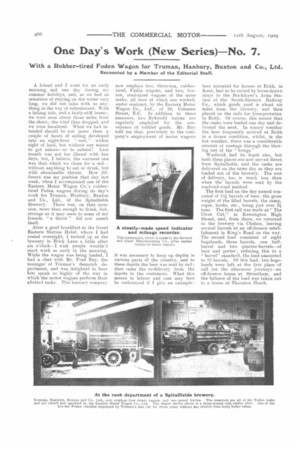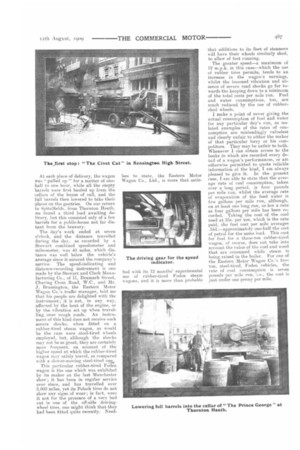One Day' s Work (New Series)—No. 7.
Page 4

Page 5

If you've noticed an error in this article please click here to report it so we can fix it.
With a Rubber-tired Foden Wagon for Truman, Hanbury, Buxton and Co., Ltd.
Recounted by a Member of the Editorial Staff.
A friend and I went. for an early morning sail one day during my summer holidays, and, as we had no intention of staying on the water very long, we did not take with us anything in the way of refreshment. With a falling tide, and a fairly-stiff breeze, we were soon about three miles from the shore; the wind then dropped, and we were becalmed. What we had intended should be not more than a couple of hours of sailing developed into an eight-hour " rest," within sight of land, but without any means to get ashore—or to subsist! Last month was not too liberal with fine days, but, I believe, the warmest one was that which we chose for a sail— without anything to eat or drink, but with abominable thirsts. How different was my position that day last week, when I. accompanied one of the Eastern Motor Wagon Co.'s rubbertired Foden wagons during its 'day's work for Truman, Flanbury, Buxton and Co., Ltd., of the Spitalfields Brewery. There was, on that occasion, more than enough to drink, but, strange as it may seem to some of my friends, " a thirst " did not assert itself.
After a good breakfast at the Great Eastern Station Hotel, where I had rested overnight, I turned up at the brewery in Brick Lane a little after six o'clock—I wish people wouldn't start work so early in the morning. While the wagon was being loaded, I had a chat with Mr. Fred Ray, the manager of Truman's despatch department, and was delighted to hear him speak so highly of the way in which the motor wagons perform their allotted tasks. This brewery company now employs two, three-ton, rubbertired, Foden wagons, and two, fiveton, steel-tired wagons of the same make, all four of which are worked, under contract, by the Eastern Motor Wagon Co., Ltd., of 24, Coleman Street, E.C. In addition to these steamers, two Ryknield lorries are regularly employed for the conveyance of bottled goods. Mr. Ray told me that, previously to the company's employment of motor wagons it was necessary to keep up depots in various parts of the country, and to these depots the beer was sent by rail ; then came the re-delivery from the depiits to the customers. What this means in labour and cost may best be understood if I give an example : beer intended for houses at Erith, in Kent, had to be carted by horse-drawn drays to the Bricklayer's Arms Station of the South-Eastern Railway Co., which goods yard is about six miles from the brewery, and then placed on the rails for transportatiois to Erith. Of course, this meant that the casks were loaded one day and delivered the next. In wintry weather the beer frequently arrived at Erith in a frozen condition, whilst, in the hot weather, there was a considerable amount of wastage through the blowing out of the " bungs."
Woolwich had its depot also, but both these places are now served direct from Spitalfields, and the casks are delivered on the same day as they are loaded out of the brewery. The cost of delivery, too, is much less than when the barrels were sent by the road-rail-road method.
The first load on the day named consisted of 151 barrels of beer, the gross weight of the filled barrels, the ramp, ropes, hooks, etc., being just over 31 tons. The first call was made at " The Civet Cat," in Kensington High Street, and, from there, we returned to the brewery via Chelsea, leaving several barrels at an off-licence establishment in King's Road on the way. The second load consisted of eight hogsheads, three barrels, one halfbarrel and two quarter-barrels—of beer and porter ; reducing this to a "barrel" standard, the load amounted to 16 barrels. Of this load, two hogsheads were left at the first place of call (on the afternoon journey)--an off-licence house at Streatham, and the balance of the load was taken out to a house at Thornton Heath.
At each place of delivery, the wagon was "pulled lip" for a matter of onehalf to one hour, while all the empty barrels were first hauled up from the cellars of the house of call, and the full barrels then lowered to take their places on the gantries. On our return to Spitalfields. from Thornton Heath, we found a third load awaiting delivery, but this consisted only of a few barrels for a public-house not far distant from the brewery.
The day's work ended at seven o'clock, and the distance travelled during the day, as recorded by a Stewart combined speedometer and mileonieter, was 40 miles, which distance was well below the vehicle's average since it entered the company's service. The speed-indicating and distance-recording instrument is one made by the Stewart and Clark Manufacturing Co., of 11, Denmark Street, Charing Cross Road, W.C., and Mr. J. Brassington, the Eastern Motor 'Wagon Co.'s traffic manager, told me that his people are delighted with the instrument ; it is not, in any way, affected by the heat of the engine, or by the vibration set up when travelling over rough roads. An instrument of this kind does not receive such severe shocks, when fitted on a rubber-tired steam wagon, as would be the case were steel-tired wheels employed, but, although the shocks may not he so great, they are certainly more frequent, on account of the higher speed at which the rubber-tired wagon may safely travel, as compared with a slower-moving steel-tired on
This particular rubber-tired Foden wagon is the one which was exhibited by its maker at the last Manchester show ; it has been in regular service ever since, and has travelled over 5,000 miles, yet its Polack tires do not show any signs of wear ; in fact, were it not for the presence of a very bad cut in one of the off-side drivingwheel tires, one might think that they had been fitted quite recently. Need
less to state, the Eastern Motor Wagon Co., Ltd., is more that satis fled with its 12 months' experimental use of rubber-tired Foden steam wagons, and it is more than probable that additions to its fleet of steamers will have their wheels similarly shod, to allow of fast running.
The greater speed—a maximum of 12 m.p.h. in this case—which the use of rubber tires permits, tends to an increase in the wagon's earnings, whilst the lessened vibration and absence of severe road shocks go far towards the keeping down to a minimum of the total costs per mile run. Fuel and water consumptions, too, are much reduced by the use of rubbershod wheels.
I make a point of never giving the actual consumption of fuel and water for any particular day's run, as isolated examples of the rates of consumption are misleadingly valueless and clearly unfair to either the maker of that particular lorry or his competitors. They may be unfair to both. Whenever I can obtain access to the books in which are recorded every detail of a wagon's performances, or am otherwise permitted to quote reliable information of the kind, I am always pleased to give it. In the present case, I am able to state that the average rate of coal consumption, taken over a long period, is four pounds per mile run, whilst the average rate of evaporation of the feed water is five gallons per mile run, although, on at least one long run, as low a rate as four gallons per mile has been recorded. Taking the cost of the coal used at 25s. per ton, which is the rate paid, the fuel cost per mile averages .54d.—approximately one-half the cost of petrol for the same load. This cost for fuel for a three-ton rubber-tired wagon, of course, does not take into account the value of the coal and wood that are consumed while steam is being raised in the boiler. For one of the Eastern Motor Wagon Co.'s fireton, steel-tired, Foden vehicles, the rate of coal consumption is seven pounds per mile run, i.e., the cost is just under one penny per mile.


















